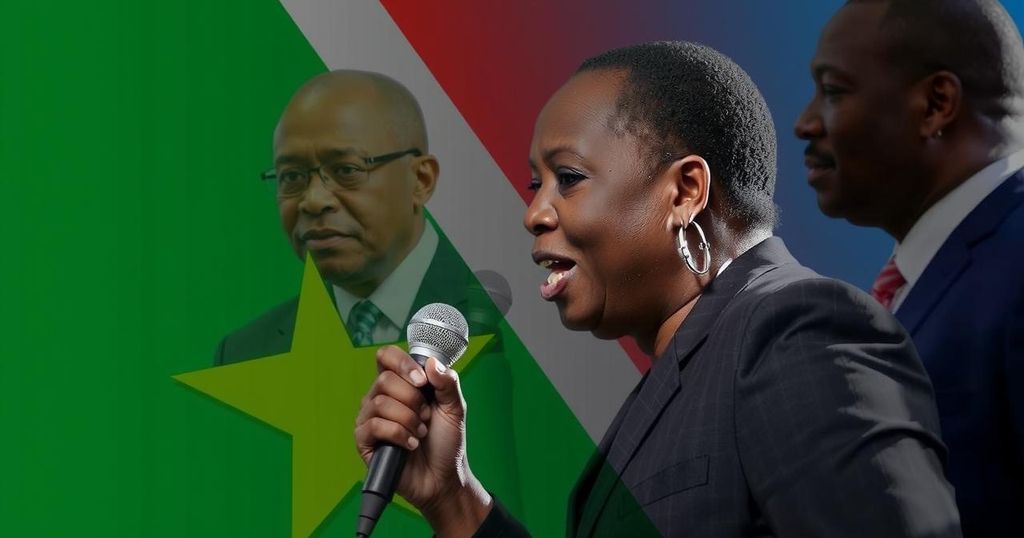Botswana’s President Mokgweetsi Masisi conceded to a significant electoral defeat, marking the end of a 58-year rule by the Botswana Democratic Party. The opposition coalition, Umbrella for Democratic Change (UDC), led by Duma Boko, gained a commanding lead, driven by socio-economic grievances among citizens, particularly the youth. The ruling party’s inability to address economic challenges, exacerbated by a downturn in the diamond market, led to this historical political shift. Analysts suggest this serves as a warning to long-standing ruling parties in Southern Africa.
Botswana’s President Mokgweetsi Masisi acknowledged his defeat on Friday, responding to preliminary election results that indicated his party, the Botswana Democratic Party (BDP), had lost its parliamentary majority decisively. The opposition coalition, leading under the Umbrella for Democratic Change (UDC) and represented by lawyer Duma Boko, gained significant traction, setting the stage for Boko’s potential rise to the presidency. Early indicators reveal that socio-economic discontent, particularly among the youth, contributed to the BDP’s declining support. The party has been in power since Botswana gained independence in 1966, yet recent downturns in the global diamond market have severely affected the nation’s economy, resulting in a staggering 28% unemployment rate. With results from 41 out of 61 constituencies reported, the UDC emerged victorious in 26 seats, while the BDP could only secure three. The parliament, which is responsible for electing the president, faces a significant shift in power dynamics. Boko has not yet made a public statement regarding the results, though his campaign focused on pivotal issues such as raising the minimum wage and improving social grants for the populace. During a press conference, President Masisi expressed, “Although I wanted to stay on as your president, I respect the will of the people and I congratulate the president-elect. I will step aside and I will support the new administration.” In Gaborone, the capital city, the atmosphere was relatively peaceful, with small gatherings of opposition supporters celebrating the electoral shift. A young student, Mpho Mogorosi, shared his sentiments: “I did not ever think I would witness this change in my life. The BDP had stayed too long in power and I am proud to be part of the people that removed them for a better Botswana.” This development marks the second time this year that a long-standing ruling party in southern Africa has been unseated at the polls, following the African National Congress in South Africa, which similarly faced a loss of parliamentary majority after 30 years of dominance. Additionally, elections in Namibia are anticipated, where the ruling SWAPO party, governing since 1990, is also expected to encounter considerable opposition. Analyst Zaynab Hoosen from Pangea-Risk noted, “The outcome of Botswana’s elections should serve as a warning to long-time ruling parties across southern Africa and beyond that without economic progress and employment opportunities, political dominance will falter.”
The recent election in Botswana stands as a pivotal moment in its political history, heralding the end of a near 60-year tenure of the Botswana Democratic Party. As the nation has relied heavily on its diamond-rich economy, fluctuations in the global diamond market have had a profound impact, leading to rising unemployment and dissatisfaction among citizens. This backdrop of socio-economic distress among the youth was crucial to the dynamic electoral outcome that has shifted the balance of power. This event parallels similar political transitions in the region, underscoring a growing trend towards electoral accountability in long-established governments.
In conclusion, the electoral defeat faced by the Botswana Democratic Party signifies not only a significant political transformation in Botswana but also serves as a critical reminder to ruling parties across southern Africa regarding the importance of addressing citizens’ socio-economic needs. The success of the Umbrella for Democratic Change reflects rising discontent amongst the populace, particularly the youth, in response to economic challenges. As neighboring nations like Namibia prepare for their elections, the results in Botswana may influence political landscapes across the region.
Original Source: www.cnn.com






